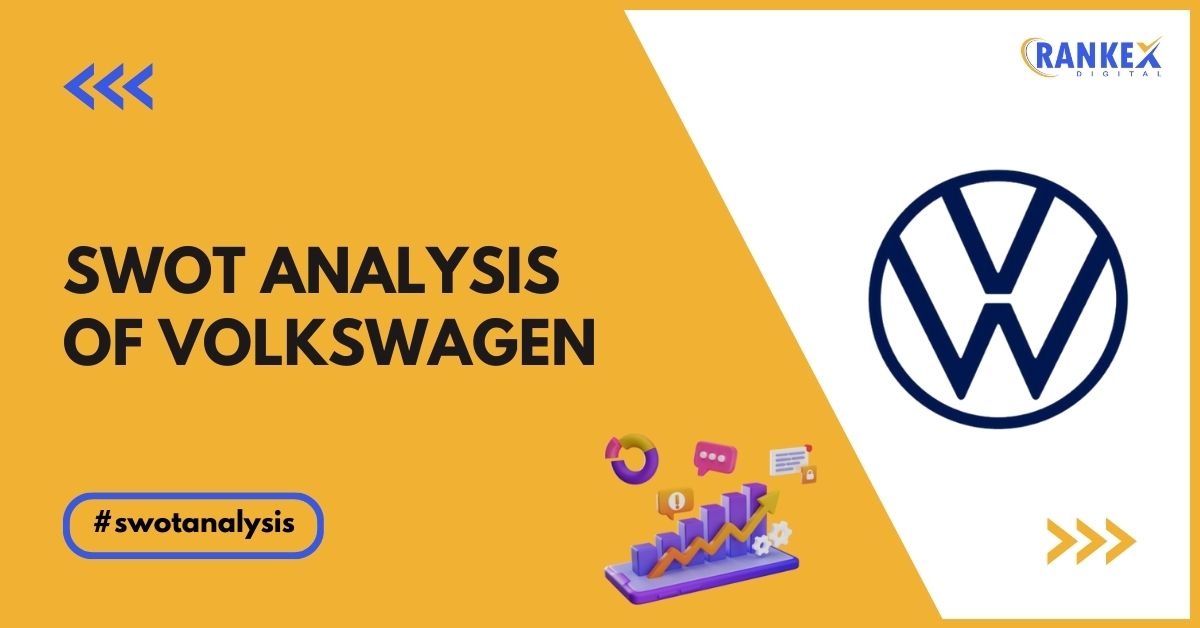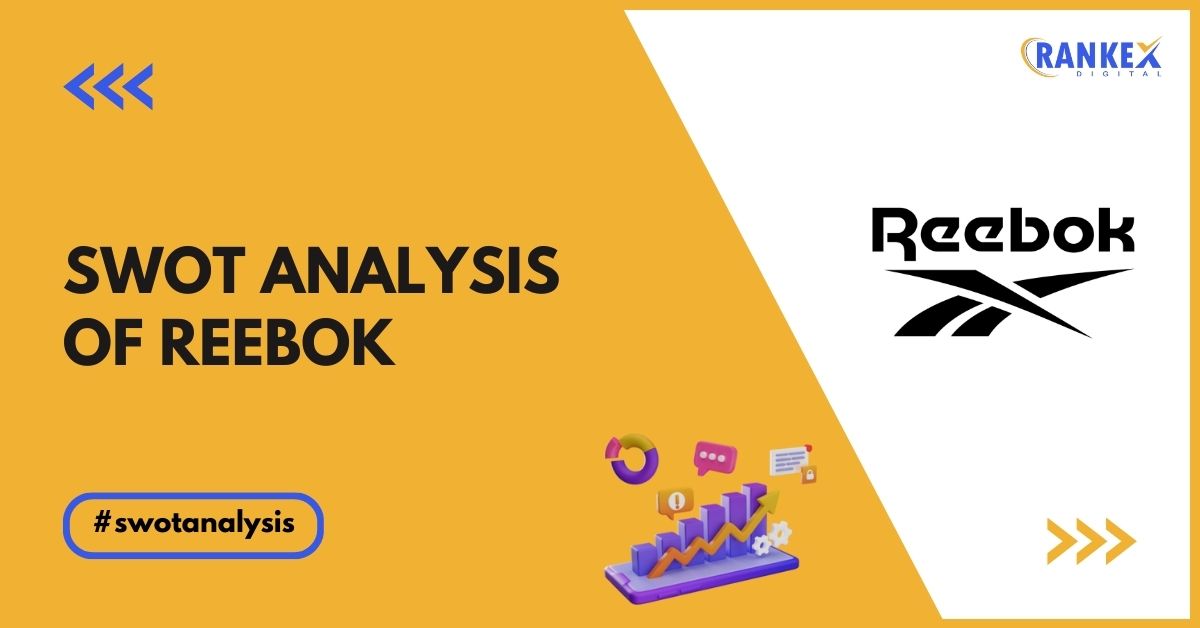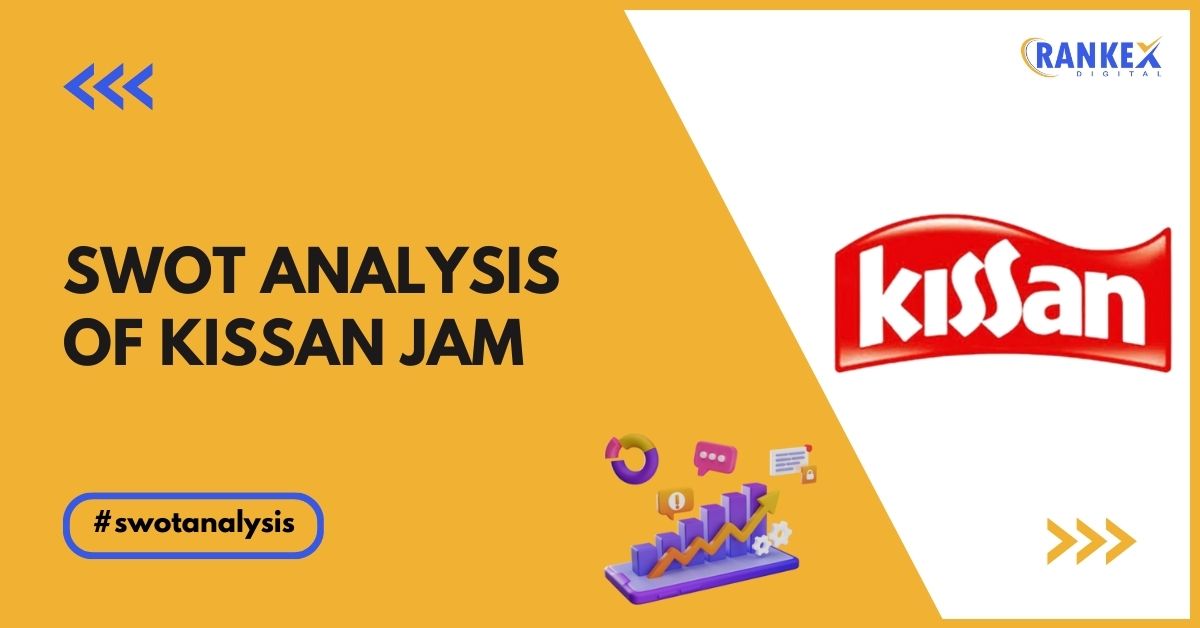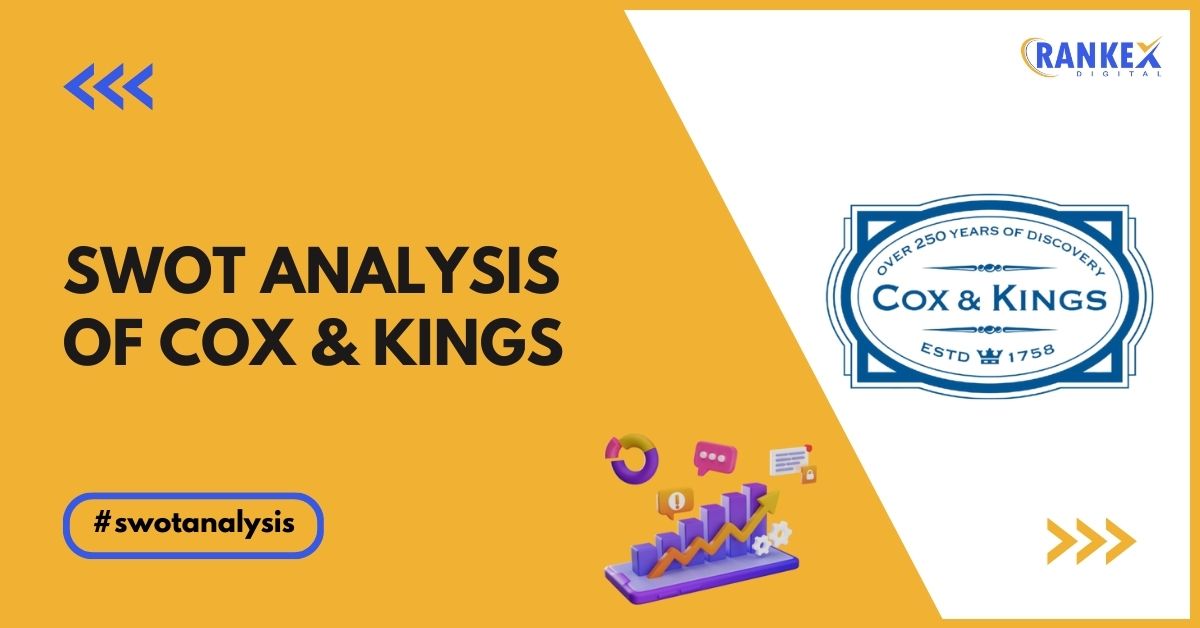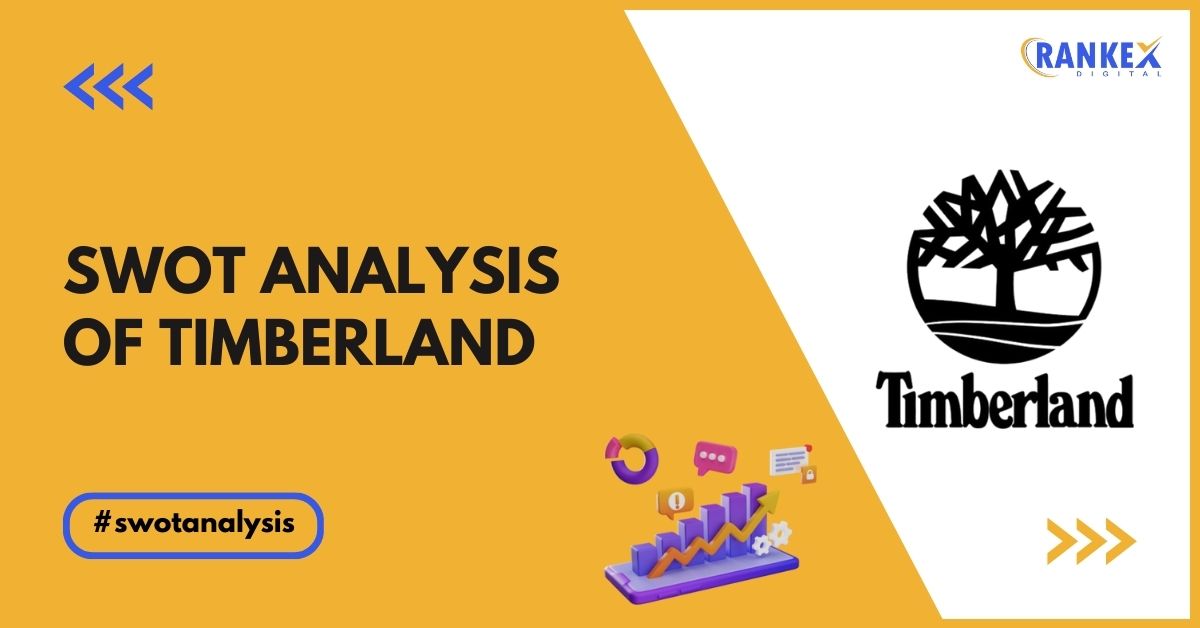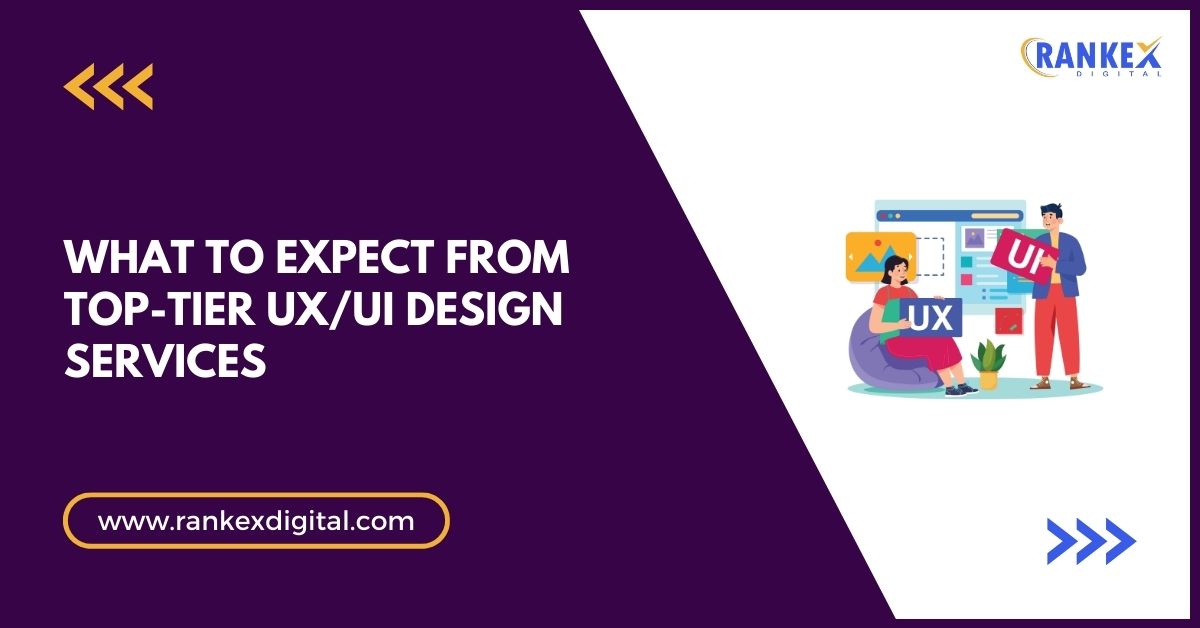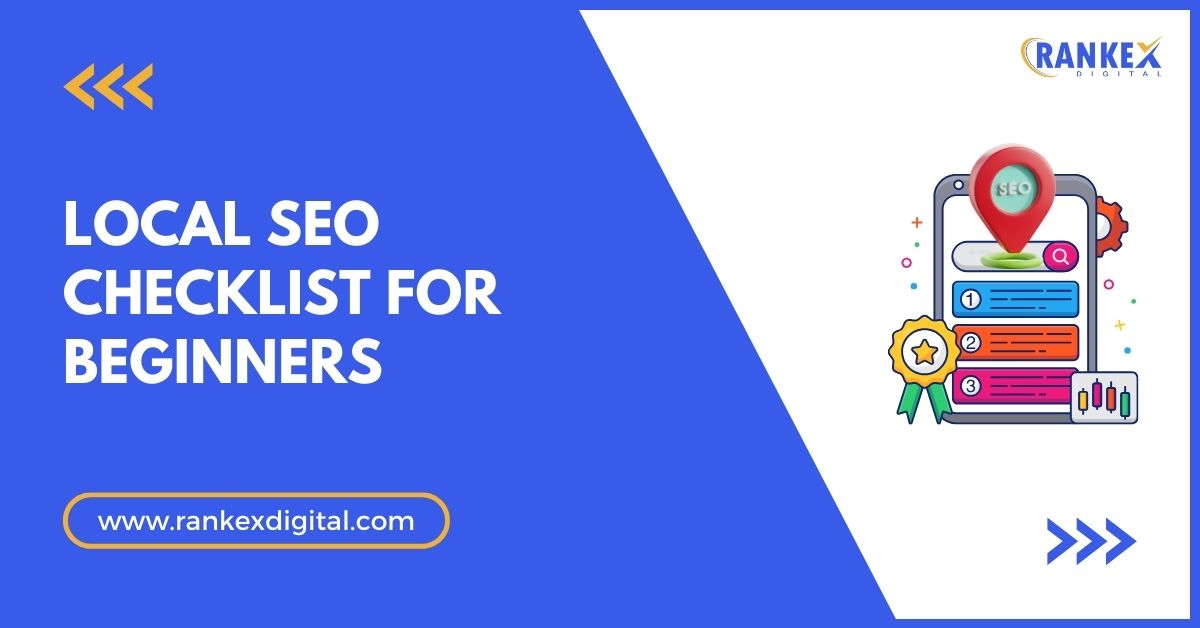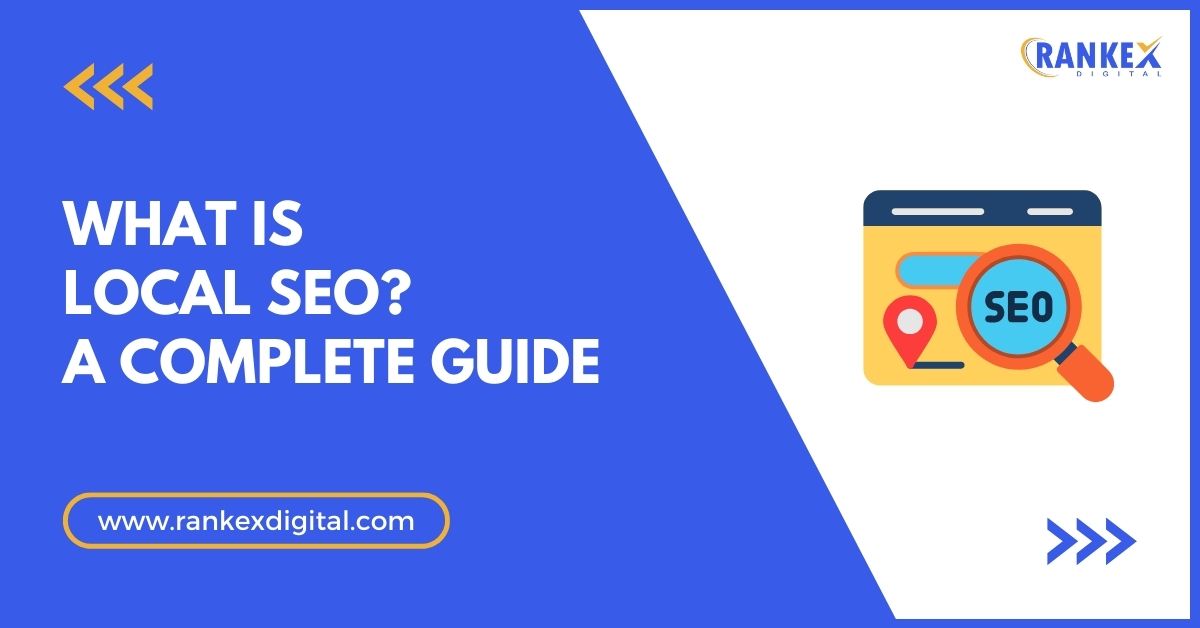Volkswagen, one of the largest car manufacturers in the world, is renowned for its innovative vehicles, quality engineering, and global presence. From the iconic Volkswagen Beetle to its current lineup of electric vehicles, the company has maintained a strong position in the automotive industry.
However, to understand its future trajectory, it’s essential to conduct a SWOT (Strengths, Weaknesses, Opportunities, Threats) analysis. This blog delves into SWOT analysis of Volkswagen, providing insights into its current performance and future potential.
In this blog
Overview of Volkswagen
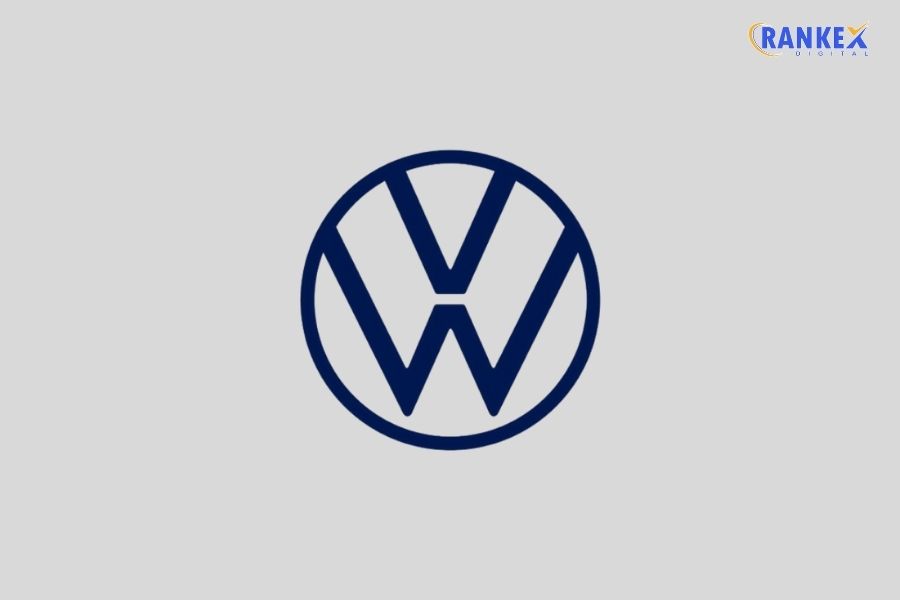
Founded in 1937 and headquartered in Wolfsburg, Germany, Volkswagen is a global automotive brand known for producing a wide range of vehicles, from compact cars to luxury models and electric vehicles. It operates under various brands, including Audi, Porsche, Lamborghini, and Bugatti, making it a significant player in the automotive sector worldwide.
Quick Stats About Volkswagen
| Attribute | Details |
|---|---|
| Founder | Ferdinand Porsche |
| Year Founded | 1937 |
| Headquarters | Wolfsburg, Germany |
| Employees | 662,000+ |
| CEO | Oliver Blume |
| Revenue (2023) | €300 Billion |
| Net Income (2023) | €20.9 Billion |
SWOT Analysis of Volkswagen
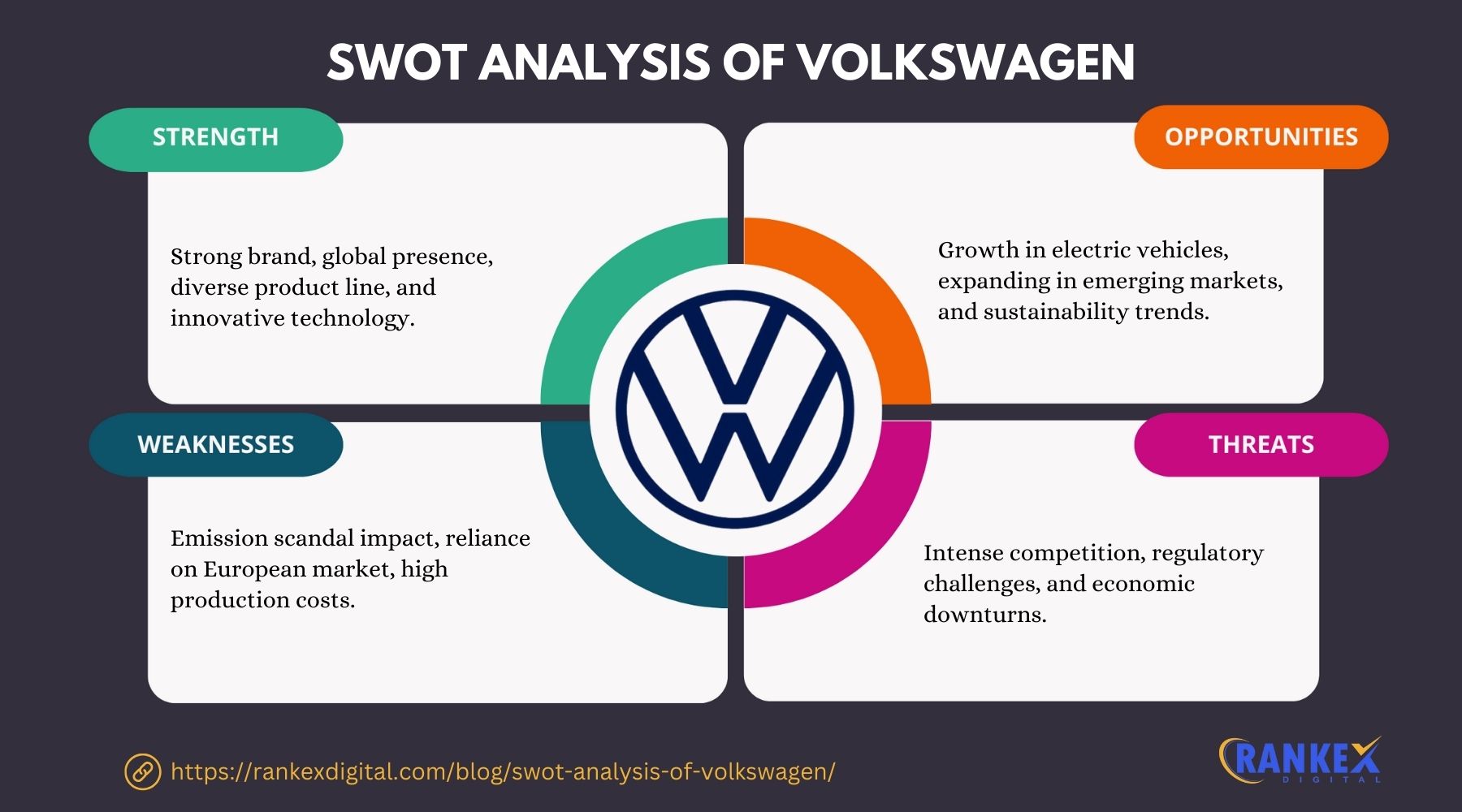
Strengths of Volkswagen
- Strong Brand Portfolio:
Volkswagen boasts a diverse brand portfolio that includes high-profile names like Audi, Porsche, Lamborghini, and Bentley, in addition to its own mass-market vehicles. This enables Volkswagen to serve a broad customer base, ranging from affordable vehicles to premium luxury cars. The company’s multi-tiered approach allows it to target multiple segments, from budget-conscious consumers to high-end luxury car buyers, helping diversify revenue streams and reduce reliance on any one market. - Global Presence:
With operations in over 150 countries, Volkswagen benefits from a strong international footprint. This global presence ensures consistent sales across diverse markets and allows Volkswagen to tap into emerging markets, such as China, India, and Latin America, where automobile demand is growing rapidly. Its widespread distribution network helps mitigate regional risks and provides a cushion against economic fluctuations in any single geographic region. - Innovative Engineering:
Volkswagen is known for its engineering excellence, producing vehicles that emphasize fuel efficiency, advanced safety features, and high-performance capabilities. The brand has consistently introduced cutting-edge technologies in both conventional and electric vehicles. Features such as adaptive cruise control, lane-keeping assist, and active safety systems position Volkswagen as a leader in integrating technology with driving experience, enhancing its competitive edge. - Electrification Leadership:
Volkswagen has committed heavily to the electric vehicle (EV) market, with the introduction of the ID series and plans for a wide range of electric models. The company’s focus on sustainable mobility is underscored by investments in EV infrastructure, including charging stations and battery technology. As the automotive industry moves toward electrification, Volkswagen is positioned to lead the charge with its strategic investments and product offerings, helping the company stay ahead in the evolving automotive landscape. - Commitment to Sustainability:
In response to increasing global environmental concerns, Volkswagen has made strides to improve its sustainability efforts. The company is actively working to reduce its carbon footprint by producing eco-friendly vehicles, embracing renewable energy sources, and enhancing recycling processes. These initiatives not only help Volkswagen meet stringent environmental regulations but also appeal to a growing number of eco-conscious consumers, further boosting its appeal in a competitive market.
Weaknesses of Volkswagen
- Emissions Scandal:
The 2015 Dieselgate scandal, in which Volkswagen was caught using software to cheat on emissions tests, severely impacted the company’s reputation. Despite its efforts to rebuild trust with consumers through transparency and new product offerings, the scandal’s long-lasting effect on consumer perception remains a challenge. Legal battles and regulatory fines from the scandal also resulted in significant financial costs that impacted profitability in the short term. - Dependence on European Markets:
While Volkswagen is a global brand, a large portion of its revenue still comes from European markets. This makes the company vulnerable to economic downturns, political instability, and regulatory changes in the region. Over-reliance on Europe for sales may expose Volkswagen to risks, particularly if consumer demand slows or stricter emissions regulations in Europe affect its product offerings. - High Production Costs:
Volkswagen’s commitment to high-quality manufacturing, advanced technologies, and sustainable production practices has contributed to elevated production costs. As demand for electric and technologically advanced vehicles increases, Volkswagen faces growing pressure to invest in expensive materials, research and development, and factory upgrades. These rising production costs may reduce the company’s ability to offer competitively priced vehicles, potentially affecting its profit margins. - Slow Adoption of Autonomous Driving:
Although Volkswagen is investing in autonomous driving technology, it has been slower to bring self-driving cars to market compared to competitors like Tesla. While autonomous vehicles are an emerging trend in the automotive industry, Volkswagen’s slower pace in adopting this technology could hinder its ability to compete in a future where autonomous driving may become more widespread. Tesla and other tech-driven companies are positioning themselves as leaders in the autonomous vehicle space, presenting a challenge to Volkswagen’s market share. - Brand Complexity:
The Volkswagen Group’s extensive portfolio of brands and models can sometimes lead to brand confusion among consumers. With multiple brands targeting different market segments, consumers may struggle to differentiate between the various offerings. For example, Audi and Volkswagen both cater to mid- to high-range consumers, which could dilute the messaging and positioning of both brands. This complexity can also complicate marketing and brand strategy, leading to potential inefficiencies.
Opportunities for Volkswagen
- Expansion into Emerging Markets:
As the middle class continues to grow in regions such as Asia, Africa, and Latin America, there is a rising demand for automobiles, particularly in the compact car and entry-level SUV segments. Volkswagen can tap into these growing markets by offering affordable, high-quality vehicles tailored to local preferences. Furthermore, Volkswagen could explore production facilities in these regions to lower manufacturing costs and pass on the savings to consumers. - Leadership in Electric Vehicles (EVs):
As the world transitions toward more sustainable transportation, Volkswagen has the opportunity to become a leader in the electric vehicle market. The company’s ID series is already making a strong entry, and it can expand its EV offerings to meet increasing demand. By continuing to innovate and improve EV battery technology, Volkswagen could differentiate itself from competitors and solidify its position in the rapidly growing eco-friendly vehicle sector. - Growth in Mobility Solutions:
Volkswagen is expanding its portfolio beyond traditional car sales by exploring mobility services such as car-sharing, ride-hailing, and on-demand transportation. With urbanization on the rise, there is increasing demand for flexible transportation solutions, especially among younger consumers. Volkswagen’s entry into this market could help it diversify revenue streams and become a key player in the future of mobility-as-a-service. - Technological Advancements:
Advancements in artificial intelligence (AI), autonomous driving, and smart connectivity offer Volkswagen a chance to integrate cutting-edge technologies into its vehicles. By developing AI-powered vehicles with enhanced driver assistance systems and connected car technologies, Volkswagen can elevate the customer experience and position itself as a leader in innovation within the automotive industry. - Sustainability and Green Technologies:
As governments and consumers place increasing pressure on automakers to address environmental concerns, Volkswagen has an opportunity to invest further in green technologies. The company can expand its production of electric drivetrains, renewable energy sources, and recyclable materials. These investments will not only allow Volkswagen to meet stricter environmental standards but also position it as a sustainability leader, appealing to eco-conscious consumers and improving brand image.
Threats to Volkswagen
- Intense Competition:
Volkswagen faces fierce competition from both traditional automakers such as Toyota, Ford, and General Motors, as well as newer players like Tesla and Rivian, which have revolutionized the electric vehicle market. These companies are innovating rapidly and challenging Volkswagen on several fronts, particularly in the EV sector. To remain competitive, Volkswagen must continue to invest in technology, innovation, and customer experience. - Global Economic Uncertainty:
The automotive industry is particularly vulnerable to economic fluctuations, as cars are large, expensive purchases. Factors like global recessions, inflation, trade wars, and fluctuations in consumer purchasing power could negatively affect Volkswagen’s sales. Economic uncertainty in major markets like the U.S., China, or Europe could cause significant disruption to Volkswagen’s revenue and growth prospects. - Regulatory Challenges:
The automotive industry is facing increasingly stringent emissions regulations, safety standards, and fuel efficiency requirements. Volkswagen’s past legal issues (like Dieselgate) highlight the risks of failing to comply with regulations. The company must navigate a complex regulatory environment, especially in key markets like Europe and North America, where lawmakers are pushing for stricter emissions and environmental standards. Meeting these regulations could increase production costs and affect Volkswagen’s ability to produce certain models. - Supply Chain Disruptions:
Volkswagen, like other automakers, is highly dependent on a global supply chain for raw materials, components, and manufacturing processes. Disruptions, such as those caused by the COVID-19 pandemic, geopolitical tensions, or semiconductor shortages, can delay production and increase costs. These disruptions could negatively impact Volkswagen’s ability to meet demand, reduce profitability, and affect customer satisfaction. - Shifting Consumer Preferences:
Changing consumer preferences toward ride-sharing and shared mobility services could affect traditional car ownership. Younger consumers, particularly in urban areas, are less likely to own cars and are opting for on-demand, flexible transportation solutions. This shift in consumer behavior may reduce the demand for personal vehicles, especially in cities where public transportation and shared mobility options are more accessible.
Frequently Asked Questions
What is Volkswagen’s biggest strength in the automotive market?
Volkswagen’s biggest strength lies in its strong global presence and diverse brand portfolio, including luxury and mass-market vehicles, which gives it a broad customer base across different segments.
How has Volkswagen’s reputation been affected by the emissions scandal?
The dieselgate scandal severely damaged Volkswagen’s reputation for trustworthiness and environmental responsibility. However, the company has since made efforts to rebuild its image through sustainable initiatives and a commitment to electric vehicles.
What are Volkswagen’s plans for the electric vehicle market?
Volkswagen is heavily investing in electric vehicles, with its ID series designed to lead the brand into the future of electric mobility. The company aims to become a leader in the EV market and achieve carbon neutrality by 2050.
How does Volkswagen handle competition from brands like Tesla?
Volkswagen competes with Tesla by leveraging its experience in engineering and quality, along with a broad range of models and new EV offerings. The company is also investing in EV infrastructure, such as charging networks, to make EVs more accessible to consumers.
What are the biggest threats to Volkswagen’s growth?
Key threats to Volkswagen’s growth include intense competition in the EV market, regulatory pressures, global economic instability, and disruptions in the supply chain that could impact production.
Conclusion
Volkswagen’s SWOT analysis highlights the company’s strong market position, driven by its global brand recognition, engineering excellence, and commitment to innovation. While challenges such as competition, regulatory pressures, and past scandals exist, Volkswagen’s focus on sustainability and electric mobility provides significant growth opportunities.
By leveraging its strengths and addressing its weaknesses, Volkswagen is well-positioned to navigate the evolving automotive landscape and continue its legacy as a global leader.

